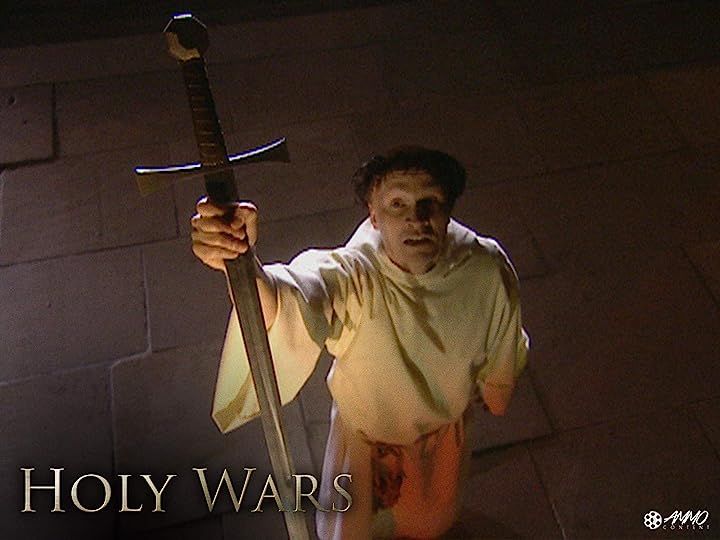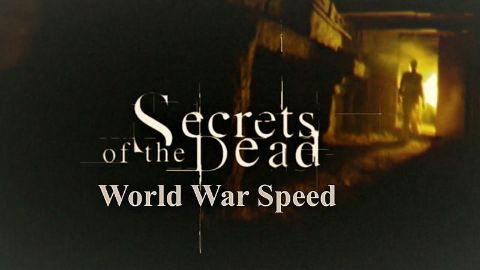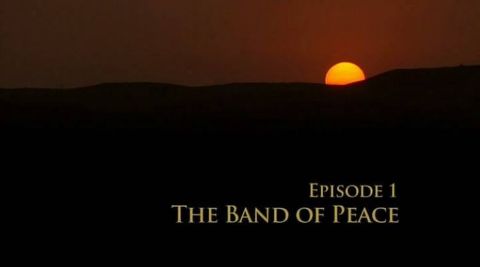The Holy Wars: War and Religion • 2004 • 3 episodes •
The times were turbulent around 1100 AD, when West-Roman Christianity was spreading out in all directions. The Crusades were part of it - perhaps the most important, certainly the best known. The advance of the Islamic Selchuks could not be stopped, especially their attacks on the travel routes of the pilgrims, who were on their way to the holy Christian sites. When news of raids mounted, the Patriarch of the Eastern Roman Church Alexios I asked Rome for help. Even then, Christianity was divided - not into Catholics and Protestants, but into the Eastern Roman (Orthodox) and Western Roman Churches. The Crusades took place in the middle of tension between these different interest groups. The expansion of the West Romans cut a swath through the Islamic territories, which had by then reached the climax of their development. The Byzantine realm increasingly lost its importance. It was not a battle of cultures, not a struggle against Islam, but a chaotic confrontation of warlords and princes. The main goal of the crusades – the conquest of Jerusalem – was soon forgotten, and the first conquest ended with bloodbaths among the civilian population that are still notorious today. The following crusades were equally infamous and far from an honor to Christianity. This program examines the forces behind European determination to capture Palestine, linking the belligerence of medieval Crusaders with their piousness. Drs. Klaus Herbers of Friedrich Alexander University and Patrick Franke of Martin Luther University draw surprising parallels between East and West, focusing on martyrdom as a vital component of the Crusader's motivation, interreligious notions of knightly behavior, and cases of negotiation and cultural exchange despite numerous atrocities and military disasters. Without neglecting the harsh realities of the Crusades, In the Name of Christ presents a fresh perspective on the medieval clash of Christian and Islamic powers.
2004 • History
Corruption, loose morals, depravity – the German monk Martin Luther had enough of this and demanded a pure church and a pure faith. His goal was nothing less than a revolution: the Reformation of the church and the ousting of the "depraved" popes. Instead, the freedom within every Christian believer was to be expressed. The first example was the Peasants' Wars. Christianity once again became divided after the downfall of Byzantium: there were now Catholics, Lutherans and Reformed, for the rebels soon went their own way. The new longing for a purer Christianity soon led to the biggest catastrophe in Europe, the Thirty Years' War. It was not foremost a religious war, although it was easier to kill more mercilessly without a legitimation than have to worry about "eternal life." Europe lost half of its population during this period. The horror of the roving hordes of soldiers, the plunge into the most terrible atrocities that humans are capable of, caused the educated to doubt the beneficial power of religion. The separation of church and state is the result of the European experience of so-called religious wars. Outlining the provincial causes and ravaging effects of Europe's Thirty Years' War, this program illustrates the ability of religious fervor to inflame nationalism and drive the quest for power. With background on Martin Luther's split with the Catholic Church and the St. Bartholomew's Day Massacre, Dr. Helmut Neuhaus of Friedrich Alexander University offers detailed analysis of the Hapsburg-Bohemian conflict, the shifting alliances of Catholics and Protestants, and the mercenary campaigns of Wallenstein—leading to a comparison with large-scale natural disaster. The program clearly identifies the three-decade inferno as an inspiration for later divisions of church and state.
2004 • History
13th Century: After a unique triumph, Islam became the religion of many peoples - from Spain to Indonesia. But there was no Islamic empire, just as there was no Christian empire. Middle Ages meant: small states, wars of princes and tribes against each other. This episode covers the spreading of Islamic and Arabic culture, which was based on the use of military slaves: children of non-Muslim Turkic peoples were trained to become Islamic elite warriors. Their military triumph not only spread war and the new faith, but also advanced culture: medicine, art, architecture, astronomy - a unique blossoming of knowledge, culture and intellectual freedom penetrated as far as Spain. The real threat to Allah's earthly kingdom came not from Europe, but from the steppes of Asia. The Mongols attacked their enemies ruthlessly, devastatingly and invincible. In 1258 AD, Baghdad, the center of Islamic civilization, fell into their hands. Military conflict accompanied the spread of Islam during the Middle Ages. This program reveals the ironies of that union between war and faith: how Islam was adopted rather than marginalized by invading Mongols; how the rise of strict Islamic orthodoxy countered the scholarly advances of Arabic culture, weakening the empire; and how European appreciation of Islamic culture grew after the Christian 'Reconquista' of the Iberian peninsula. Interviews with respected scholars—including Drs. Raif Georges Khoury of the University of Heidelberg and Patrick Franke of Martin Luther University, Halle-Wittenberg—illuminate key developments in Islam's Mediterranean dominance.
2004 • History








